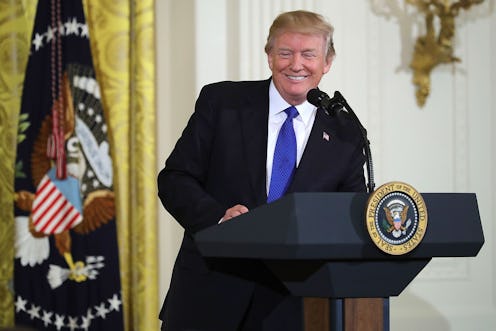News
7 Things You Should Know About Trump's New Immigration Plan

President Donald Trump has proven himself time and time again to be a deeply inflammatory and divisive voice on immigration, but that hasn't stopped the White House from teasing a "framework" plan, some details of which were reported by the press on Thursday. As such, you might want to familiarize yourself ― here are seven things you should know about Trump's new immigration plan.
It's important to note that these reported details are still, at a fundamental level, rumors. Throughout the first year of the Trump administration, there would occasionally be reports about deals or executive order drafts that would ultimately not come to fruition, and the White House hasn't made any of this official just yet. Rather, some details of the plan were reportedly leaked to the press on Thursday, giving possible insight into the administration's negotiations.
In short, according to The Daily Beast, there are a number of trade-offs the administration is eyeing to get what it wants, with a top priority being Trump's long-promised construction of a wall along the country's border with Mexico. Here are seven facts about the rumored immigration plan you'll definitely want to know about, if the reported details are indeed accurate.
1. DACA Recipients Could Become U.S. Citizens
According to The Daily Beast, White House policy adviser Stephen Miller recently said on a briefing call to administration surrogates that the plan would open up the possibility of citizenship for the nearly 700,000 Dreamers currently living in the United States, provided that they possess "work history, the right amount of education, and good moral character."
2. DACA-Eligible Immigrants Who Never Applied Could Also Become Citizens
In addition to the approximately 700,000 current DACA recipients, the path to citizenship would reportedly also extend to all DACA-eligible immigrants who didn't apply for the program, pushing the number of potential citizenship applicants to a total of 1.8 million. It's worth noting, however, that Miller is an extremely far-right hardliner on immigration, and as such it's unclear how high the bar would be placed for applicants in terms of their education, work history, and "moral character."
3. But Trump Wants The Border Wall In Return...
One huge win the White House would get out of this would be the construction of a wall along the U.S.-Mexico border, according to the reported details of the plan. The border wall is one of Trump's longest-standing and most frequently repeated campaign promises.
4. ... And Mexico Isn't Paying For It
The deal would mean his repeated insistence that Mexico would pay for the construction of the wall, however, was false. To the contrary, the administration is demanding $25 billion for border security, which would include the money for the wall. In other words, Mexico wouldn't be paying for Trump's wall, the American taxpayer would.
5. The Diversity Immigration Lottery Would Be Changed
The deal would also reportedly change the diversity visa lottery. As it currently operates, the lottery awards 50,000 visas per year to foreign applicants through a drawing, provided they meet some basic requirements, like having a high school diploma, or two years work experience. The deal would change the system to what Miller calls a "high skill-based" system. Again, however, what precise requirements or "high-skill" benchmarks the administration would apply to the diversity lottery is not yet clear.
6. Family Sponsorship For Citizenship Will Be Limited
Another component of the deal, according to The Daily Beast's accounting of Miller's conference call, would be limits on legal permanent residents sponsoring their family members for U.S. citizenship. The White House, and Miller specifically, often refer to this practice as "chain migration," a term Illinois Senator Dick Durbin has argued is offensive. Under the new system, legal permanent residents would reportedly no longer be able to sponsor adult children or siblings, with only spouses and minor children.
7. The White House Is Calling It A "Dramatic Concession"
In the call, Miller reportedly portrayed the proposal as a "dramatic concession" to the Democratic Party. Leading Democrats were not impressed when the details of the plan hit the presses on Thursday, however ― including House Minority Leader Nancy Pelosi, for one. According to Axios' Alexi McCammond, Pelosi described the plan as "part of the Trump Administration’s unmistakable campaign to make America white again."
In short, it's still unclear whether the details reported by The Daily Beast on Thursday are the same as what'll be in the plan when it's officially released to the public. Whatever plan is eventually released is overwhelmingly likely to be controversial, however, thanks to the president and Miller's decidedly far-right instincts on immigration.